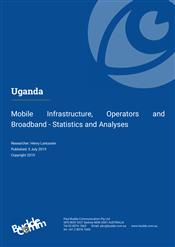Uganda - Mobile Infrastructure, Operators and Broadband - Statistics and Analyses

Last updated: 5 Jul 2019 Update History
Report Status: Archived
Report Pages: 45
Analyst: Henry Lancaster
Synopsis
In common with other countries in the region, mobile voice and data services have had a profound effect on Uganda’s telecommunications market, particularly given the poor condition of fixed-line infrastructure. This has meant that mobile networks carry most voice traffic and account for the vast majority of internet connections. With recent investment in LTE technologies, the reach and capabilities of mobile broadband services have increased substantially. This has led to a range of social benefits, including the ability of individuals to make use of banking and a range of m-commerce services.
Greater internet bandwidth through international cables has also reduced the cost of mobile backhaul, and consequently the end-user cost of such services has fallen steadily. The market remains overcrowded, with several networks in contention, and there is room for further consolidation among operators. In recent years Bharti Airtel took over Warid Telecom and Smart Telecom entered the market, while Orange Uganda decided to exit the market, selling to Lebanon-based Africell Holding. Orange Uganda completed its rebranding as Africell in February 2015. Uganda Telecom fell into receivership and in late 2018 a majority stake was sold to Teleology Holdings. Two of the smaller mobile players, K2 Telecom and Vodafone Uganda, have not weathered competitive pressure. The management of K2 Telecom’s services and network has been taken over by Airtel Uganda, while Vodafone Uganda entered bankruptcy protection in February 2018.
Key developments:
- SIM card registration leads to large drop in subscriber numbers;
- MTN Uganda has licence renewal fee increased;
- Vodafone Uganda files for bankruptcy protection;
- Ericsson deploys its Converged Wallet platform for MTN Uganda;
- Opportunities grow for MVNOs and tower outsourcing companies;
- Regulator reports on QoS assessments;
- Report update includes the regulator's market data to September 2018, operator data to Q1 2019, recent market developments.
Companies mentioned in this report:
MTN Uganda (Telia), Bharti Airtel (Zain, Celtel), Uganda Telecom (UTL, LAP Green, Telecel, Orascom, Deutsche Telekom), Warid Telecom (Essar), Orange Uganda (HiTS Telecom), i-Tel, Simba Telecoms, Standard Chartered Bank, Monitise, American Tower Corporation (ATC), Eaton Towers, Smile Telecom, Smart Telecom, Sure Telecom, K2 Telecom, Africell (Lintel).
Related Reports
- Africa - Fixed Broadband Market - Statistics and Analyses
- Uganda - Telecoms, Mobile and Broadband - Statistics and Analyses
- 2019 Africa - Mobile Network Operators and MVNOs
- Ethiopia - Telecoms, Mobile and Broadband - Statistics and Analyses
- Morocco - Telecoms, Mobile and Broadband - Statistics and Analyses
- Namibia - Telecoms, Mobile and Broadband - Statistics and Analyses
- Madagascar - Telecoms, Mobile and Broadband - Statistics and Analyses
- Benin - Telecoms, Mobile and Broadband - Statistics and Analyses
- Cameroon - Telecoms, Mobile and Broadband - Statistics and Analyses
- Eritrea - Telecoms, Mobile and Broadband - Statistics and Analyses
Share this Report
TMT Intelligence
A platform to scale your intelligence tasks
Monitor critical insights with our AI-powered Market Intelligence Platform gathering and analyzing intelligence in real time. With AI trained to spot emerging trends and detect new strategic opportunities, our clients use TMT Intelligence to accelerate their growth.
If you want to know more about it, please see:
Research Methodology
BuddeComm's strategic business reports contain a combination of both primary and secondary research statistics, analyses written by our senior analysts supported by a network of experts, industry contacts and researchers from around the world as well as our own scenario forecasts.
For more details, please see:
More than 4,000 customers from 140 countries utilise BuddeComm Research
Are you interested in BuddeComm's Custom Research Service?
Hot Topics
News & Views
Have the latest telecommunications industry news delivered to your inbox by subscribing to BuddeComm's weekly newsletter.